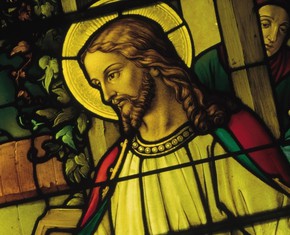The views expressed in our content reflect individual perspectives and do not represent the authoritative views of the Baha'i Faith.
Believe it or not, the prophet Muhammad appeared to Baha’u’llah in a dream.
Within the Islamic context, the appearance of Muhammad in a dream has real significance. Unlike Western culture—which widely considers dreams to be a figment of the imagination, or projection of wish images, or expressions of repressed fears, or symbolic of deep, psychological needs—classical Islamic tradition ascribes both authenticity and, in some cases, spiritual authority, to clear and direct messages conveyed in dreams.
Let’s first look at the dream in which the prophet Muhammad conveys a profound message to Baha’u’llah—and therefore through Baha’u’llah, the prophet and founder of the Baha’i Faith. Here is Baha’u’llah’s personal account of that particular dream, in this provisional translation by Necati Alkan:
One day I saw in a dream that I associated with His Holiness, the Apostle (Muḥammad), may the souls of all else but Him be sacrificed for His sake. Words were revealed and utterances were made manifest from that Dawning-Place of God’s Book. Thereupon He (Muḥammad) said:
“Previously I had said: ’Paradise is beneath the shades of swords (al-jannatu taḥta ẓilāli al-suyūf).’ However, if I were manifest in these days, I would say: ‘Paradise is beneath the shade of the tree of friendliness and compassion’ (al-jannatu taḥta ẓilāli sidrati al-ulfati wa al-raḥma)’.”
Upon hearing this blessed and exalted Word, I (Baha’u’llah) declared: “May the souls of all men be a sacrifice unto Thy loving-kindness, tender mercy and bounty!” Subsequently, the Ocean of utterance (Baha’u’llah) spoke that which the Pen was unable to reveal and the ink not capable to make manifest. When I woke up from my sleep I have found Myself filled with gladness for a time, in such wise that it was beyond description. – Baha’u’llah, Lawḥ-i Ṭabīb, provisional translation by Necati Alkan.
In this dream narration, Baha’u’llah tells us that he and Muhammad “associated” with each other. This immediately places Baha’u’llah’s dream in a distinct class of its own.
The majority of reported dreams in which Muhammad is said to appear are cast in the form of reports of words that are heard within the dream itself, but are not the product or outcome of a conversation.
Dialogue, after all, presupposes a certain equality of status between those who converse. Such is not the case in which Muhammad appears to a pious Muslim in a dream. While there is definitely communication, typically no “conversation” takes place.
But in Baha’u’llah’s dream of Muhammad, they converse as friends and as equals. Muhammad says within the dream itself: “Paradise is beneath the shade of the tree of friendliness and compassion.”
The chain of transmission is simple: This is Baha’u’llah’s direct report of what he himself personally heard the prophet Muhammad say. Let’s talk about the tradition itself, in which Muhammad is reported to have previously said:
“Swords are the keys to paradise” (al-suyūf mafātīḥu al-janna). …
The Messenger of God (Muḥammad) said, “All that is good lies in the sword and under the sword’s shadow, for people shall not rise save by the sword and swords are the keys to Paradise and Hellfire” (al-khayru fī l-sayfi wa-taḥta ẓilli l-sayfi wa-lā yuqīmu l-nāsa illā l-sayfu wal-suyūfi maqālīdi l-jannati wa l-nāri). … – Sean W. Anthony, “Muḥammad, the Keys to Paradise, and the Doctrina Iacobi: A Late Antique Puzzle.” Der Islam 91.2 (2014), p. 257.
Here, the word “sword” is a metonymy—a figure of speech where “sword” symbolizes “jihad.” Professor Leah Kinberg has researched and studied the role of dreams in early Islam. Evidently, for a period of time in early Islam, a dream could be invoked as a source of authority. The spiritual reality behind the phenomenon of the true dream (as distinct from the dream that arises from pure imagination) was recognized way back then, as it is now in the Baha’i writings, although Baha’i and Islamic views of dreams differ. Professor Kinberg writes:
A widely circulated Prophetic ḥadīth states that a vision of the Prophet in a dream is deemed equal to his actual appearance. In other words, regardless of time and place, one who has seen the Prophet in a dream is deemed equal to a ṣaḥābī, a companion of the Prophet. Consequently, Prophetic words heard in dreams may have the same impact as words preserved in ḥadīth…
The authoritative power of manāmāt [“dreams”] is anchored in the recognition of these dreams as the vessels of sound transcendental knowledge. … Although the value of a dream message does not depend on the appearance of the Prophet, the wide distribution of reports about communications of the Prophet in dreams conveys a real need to see the Prophet rather than anyone else. Ja’far al-Ṣādiq (d. 148/765) is reported to have said, “If any one sees the Prophet in a dream, then good, indeed, will be its effect … and verily will one enter Paradise, who so sees the Prophet in a dream, and great will be the honor that he will receive.” – Leah Kinberg, “Dreams,” Encyclopaedia of Islam,” Third Edition.
As applied to the appearance of the prophet Muhammad to Baha’u’llah in a dream, this Islamic doctrine has profound significance, at least potentially. If it is true that the appearance of Muhammad in a dream can be invoked as spiritual authority attesting the authenticity of a tradition ascribed to the Prophet Muhammad, then why not the authenticity of the statement itself, if conveyed by Muhammad in a dream?
For Baha’is, Baha’u’llah’s authority is independent of the authority of Muhammad. Therefore, a Baha’i would accept the authenticity of this new saying of Muhammad based on the authority of Baha’u’llah himself.
Even if this dream is appreciated purely for its symbolic value, the significance remains the same. In this day and age, Baha’is believe, the “sword”—i.e. Islamic holy war—is no longer one of the “keys to Paradise.” Quite the opposite may be true, in fact (except in the case of a defensive, “just war”). Because it says “Paradise is beneath the shade of the tree of friendliness and compassion,” this invocation of peace obviously is a Baha’i teaching. Yet given the fact that this source is said to be from the prophet Muhammad himself, this very same saying can be regarded as having not only Baha’i authority, but Islamic authority as well.
If the world accepted this proposition as true, it could have profound implications for contemporary Islamic social policy, strictly forbidding the use of force and coercion in matters of faith.
Baha’u’llah’s dream states a difference in order to make a difference in the world today.
You May Also Like
Comments

















in the two quotes, I see a symbolic passing of the torch, so to speak.
The Persian and Arabic source is available online in Ma`iydih-e Asmani vol. 8 87-8: unfortunately the spam filter will not allow me to provide the URL at the Bahai Reference Library.
Does this Lawh-e Tabib have any relation to the Lawh-e Tabib (ii) published in Ma`iydih-e Asmani vol. 8 p 156, and dated 1880 ?
Also, the way I understand the utterance "Peace lies beneath the shade of swords" is that the Prophet is not referring to Jihad or physical swords, but the Word of God itself as a sword that divides between the righteous and the unrighteous. And in this Day of Baha'u'llah, the Word ...of God will no longer be likened unto a sword, but a heavenly stream of Utterance, an "Ocean" that all may draw pearls from.
Pierre Madjitoloum